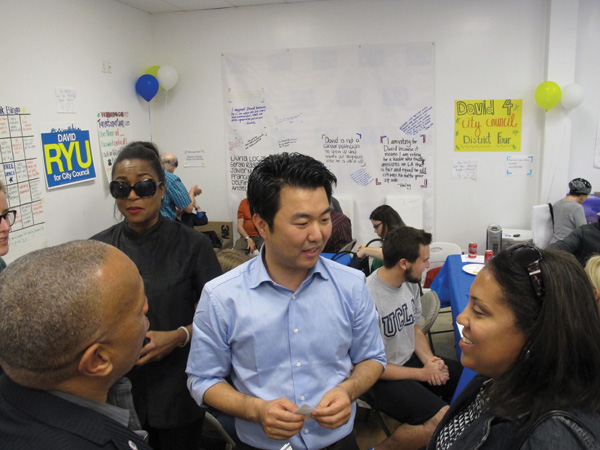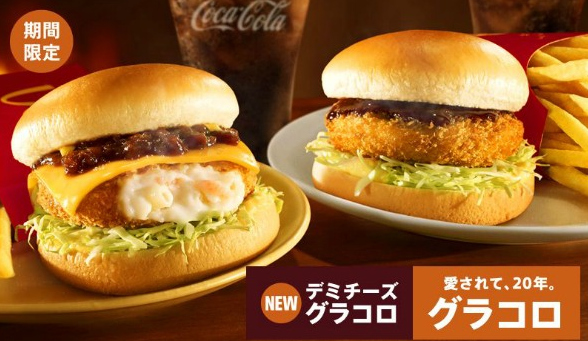Pictured above: L.A. City Council candidate David Ryu, center, speaks with supporters during the grand opening of his Sherman Oaks field office on April 11.
by SUEVON LEE | @suevlee
editor@charactermedia.com
It’s shortly after 3 p.m. one late March afternoon, and slowed by Los Angeles’ crawling traffic, David Ryu is weaving down the 101-South freeway, one earbud in place, as he makes calls on his smartphone while intermittently checking his maps app to make sure he’s on the right track.
The 39-year-old is trying to arrive on time for a meeting with union representatives at SEIU-United Healthcare Workers West. To an L.A. City Council candidate, every endorsement counts, after all—and so does being prompt. As Ryu darts in and out of lanes, the sun pouring into his silver Toyota sedan, the drive seems like a fitting metaphor for the candidate’s experience on the campaign trail the past 12 months: frenetic, nonstop, somewhat bumpy, but with eyes set on the target at the end of the journey.
Indeed, ever since Ryu came in a close second in a crowded 14-candidate field in the Council District 4 primary, earning a spot in the runoff election against Carolyn Ramsay, the gears further shifted.
“We went into overdrive after March 3,” Ryu tells KoreAm from behind the wheel of his vehicle, citing days that start at 6 a.m. and don’t end until 2 a.m., as he prepares for the May 19 runoff that will determine whether he or Ramsay can claim the next four years at City Hall.
The L.A.-raised Korean American, who stepped down as director of development at a nonprofit health care provider to run in this year’s election, is vying to replace termed-out Councilman Tom LaBonge to serve a sprawling district that runs from Hancock Park through the Hollywood Hills and west to Sherman Oaks, a largely affluent area with a population of 265,000.
His opponent is LaBonge’s former chief of staff—a City Hall insider and former environmental director who is backed by most every sitting L.A. City Council member, plus former CD4 candidates and then some (Update: on Tuesday, Ramsay was endorsed by Los Angeles Mayor Eric Garcetti).
Ryu’s efforts to become only the second Asian American, and first-ever Korean American, on the 15-member L.A. City Council, have been marked by avid fundraising drives, a door-to-door campaign to meet the district’s residents, and an emphatic message that he is an “outsider” candidate who is running to “change the conversation in City Hall.”
Ask him about his status as a Korean American running to join a historically non-diverse City Council, though, and expect no extended rumination on the relevance of his ethnic identity.
“I can’t deny the fact that there’s only been one Asian American ever elected in the history of Los Angeles,” Ryu says, “but I’m not running as an Asian American. I’m running for all communities. Whether you’re Asian, African American, Caucasian, Jewish, your voice is not heard in City Hall. I’m running to make sure everyone who doesn’t have a voice has a voice.”
No Asian American has won a seat on the council either before or since the Chinese American Michael Woo served from 1985 to 1993. While others have come close—most recently, John Choi, a Korean American who in 2013 made it past the primary but lost in the runoff to Mitch O’Farrell—a spot on L.A.’s legislative body has been an elusive one for Asian Americans, despite representing 13 percent of the city’s population.
To overcome that historic specter of electoral defeat, Ryu is trying to appeal to a broad coalition of voters, touting his roots in the district, immigrant family’s economic hardships when they first started out in the U.S., and years of working in the public sector.
The UCLA biology major worked in advocacy nonprofits and international development after graduation and was a staff member to former L.A. County Supervisor Yvonne Burke. He has picked up endorsements from such groups as the Los Angeles County Democratic Party and California Democratic Party.
He brushes aside any suggestion that his runner-up standing in the primary, in which he edged ahead of Tomas O’Grady by 207 votes and trailed Ramsay by just 85 votes, according to L.A.’s certified election results—was a surprise development. (“There were no plans to lose,” he says, when asked what his plans would have been had he failed to advance to the general.)
“We did exactly what we were expected to do, and we actually underperformed,” he says. “But actually it’s a good thing we came in second place. Had we won by over a thousand votes or a large margin, everyone would not have seen the importance of voting.”
Indeed, voter apathy has long been an impediment for candidates in Los Angeles. Turnout for the municipal primary was a dismal 8 percent—the lowest since 2003—and the forecast for the May 19 runoff is not expected to be much stronger.
Still, there is more than expected voter apathy Ryu has had to contend with in these final weeks, and that includes the distraction of news reports uncovering details from his personal past.
On April 20, just a month before the runoff election, the Los Angeles Times reported that a 27-year-old Ryu was charged with attempted rape of an unconscious person, in 2002. The charge was dropped two months later, after the Los Angeles County District Attorney’s Office said it was unable to prosecute the case within the required statutory time. Mark Kim, Ryu’s attorney at the time, told the Times that “conflicting evidence” led to the outcome.
In a statement released after the case came to light, Ryu adamantly denied any wrongdoing. “It was a shock to be accused of something I did not do, and I would never do,” he said. “Never in my life did I imagine I would be falsely accused of such a serious crime.” His statement added he has “long since put this behind me.”
To get past this blight to his campaign, Ryu continues to emphasize his background and his family’s hardscrabble immigrant roots as he tries to woo voters.
Ryu is the oldest of three whose mother, tired of Korea’s patriarchal society, initiated her family’s immigration to the U.S. David came over at age six. He was raised in part by his grandmother, who came to the U.S. to take care of David and his two younger siblings while his parents worked to provide for their family.
They lived in a two-bedroom, 700-square-foot apartment in Los Angeles. Money was tight and the Ryus applied for food stamps. His father made keys, shined shoes and worked as a security guard, while his mother worked as a nurse. She used a friend’s address as the family’s residence so the children could attend better public schools.
“My story, it turns out, is not my story, it happened to a lot of Asians that immigrated in the ’70s, in the ’80s,” Ryu says. “But again, it’s not a Korean American story, it’s not an Asian American story, it’s not a Mexican American story, it’s the American story.”
***
 David Ryu stands beside union representatives during the grand opening of his Sherman Oaks field office.
David Ryu stands beside union representatives during the grand opening of his Sherman Oaks field office.
Core issues that have dominated the Council District 4 race include out-of-control development, infrastructure needs like broken streets and sidewalks, and jobs creation. CD4 residents worry that development will create even more congestion on the streets and bemoan the practice of razing smaller, older homes to build larger ones, in what’s known as “mansionization.”
Recognizing voters’ perception that developer dollars tend to dictate the agenda at City Hall, Ryu in early April pledged to reject campaign donations from developers who are planning projects in the district, including returning nine donations totaling $4,300 to his campaign.
For a first-time candidate, Ryu has amassed an impressive war chest. He raised over $400,000 leading into the primary, outpacing every other candidate in the CD4 race. His average donation was $200, but he credits his ability to solicit small $5 donations as successful outreach to would-be voters.
“It’s sometimes harder to get a $5 donation than a $700 donation,” he says. “If someone’s willing to take their time to write a $5 check, now they’re invested, now they’ll vote for you. If they don’t live in the district, they’ll tell their friends about you.”
Granted, the Korean American community has been a valuable tapped-into source of campaign support for the bilingual Korean American, who has set up voter registration and donation drives at such places as outside L.A. Koreatown’s Galleria Market and H-Mart grocery store.
If there’s anyone who knows what it takes for an outside, minority candidate to become elected in the city, it’s Woo, whose first attempt to become a City Council member in 1981 was unsuccessful before he prevailed four years later.
“The challenge for an Asian American candidate is to be simultaneously an ethnic candidate but also a candidate who can appeal to many groups,” Woo, dean of the College of Environmental Design at California Polytechnic State University, Pomona, says in an interview. “The number of Asian American voters typically is not large enough to win an election; on the other hand, you need every single Asian American vote you can get because the turnout is going to be so low.
“[Ryu’s] got a fighting chance to win, but it certainly is not going to be easy because voters aren’t really paying any attention,” Woo adds. “There really isn’t a clear perception of what the issues are or what distinguishes one candidate from the other.”
That is why Ryu’s campaign strategy involves targeting specific neighborhoods where voters will turn out, and meeting directly with them. And it’s been so demanding that it leaves little room for anything else.
When asked what he’s learned most about himself during this past year, Ryu shrugs, and says, “I haven’t had enough time to think.” Asked what he does to unwind, he responds, “I’ll unwind on May 20.” But the candidate does have thoughts on what an election win this year could signal.
“If someone like me … an outsider, a community candidate … is able to win this election, then it signifies change,” Ryu says. “I did not get any support from any establishment, from any special interest. So if someone like me wins, then it makes other people see the [possible] achievement.”
___
This article was published in the April/May 2015 issue of KoreAm. Subscribe today! To purchase a single issue copy of the April/May issue, click the “Buy Now” button below. (U.S. customers only. Expect delivery in 5-7 business days).









